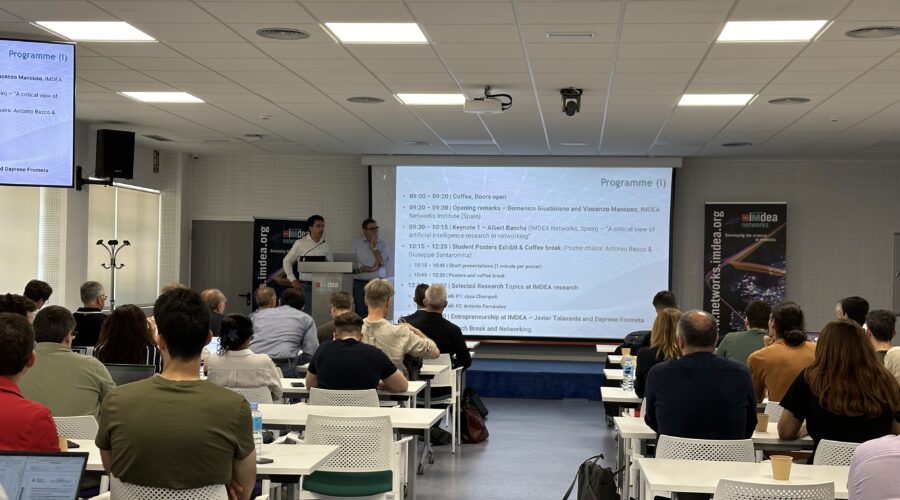IMDEA Networks

14th Annual IMDEA Networks Workshop: meeting with the future of telecommunications
Renowned international experts met with IMDEA Networks' research staff and Alumni network to discuss trends in network research and the potential of emerging technologies
04 July 2024

At the 14th Annual IMDEA Networks Workshop held in Madrid on May 28th, 2024, several renowned international experts gathered with IMDEA Networks Researchers and Alumni to debate about networking research trends and the potential of emerging technologies.
Artificial intelligence and its applications to network management and service creation in future networks has emerged as one of the key aspects of ongoing research in the community of network engineering at large, in particular as telecommunication engineering and computer science progress toward new technologies and paradigms.
It was recognized that Artificial Intelligence and distributed machine learning can be extremely useful to solve hot challenges that are specific to the new generation of wireless networks and that are calling for efficient and dynamic solutions in design of the framework that will propel us beyond the capabilities of current 5G networks.
At the same time, the participants highlighted how it is still important to pursue analytical studies and models that, as of today, can be faster, more accurate and less energy-hungry than artificial intelligence and machine learning in specific contexts; or that using traditional modeling tools in combination with artificial intelligence might produce significant advances at a very fast and promising pace, with efficiency that fully non-analytical methods are still unable to achieve.
In the adoption of artificial intelligence for networked services that involve human users, the participants also discussed how it can introduce some bias in the analysis of data, which might give rise to potential discriminatory behaviors based on social stereotypes. That calls for regular audits of artificial intelligence-enabled systems, to foster fairness, transparency and accountability.
For what concerns the future of artificial intelligence in networking, the fact that network resources are ubiquitously available, makes it possible to think of novel multi-tier architectures for artificial intelligence and machine learning. In particular, distributed computing power is available in a continuum that goes from small end-user devices to mighty cloud servers, and through potentially many mid-sized edge servers that network operators are in the process of deploying in their infrastructures. So, the researchers attending the workshop debated the possibility of using hierarchical inference tools distributed in the network, as well as the practicality of adopting digital twins for the control of industrial processes and IoT.
Another important point debated at the workshop concerned security and privacy threats that widespread telecommunication market products are bringing. They are essentially black boxes that rely on well-known communication technology, but offer no control on what they are actually doing and no transparency at all. Whereas ordinary customers have no tools to detect misbehaviors and information leakages, and technology developers in industry are urged to deliver new products and service releases at a fast pace, it becomes researchers’ duty to fill this gap and keep watching how every-day technology might put customers at risk. Identified problems are very worrisome, going from twitching avant garde technology for stalking purposes or other undesirable privacy/security-related threats.
A further topic dealt with at the workshop concerned some new algorithmic aspects of statistical methods that find their application in the forecast of events. Here the focus shifted from machines to humans, with examples that relate the ability to estimate how a population gets infected and diseases spread (e.g., in studies related to COVID-19) or predict election results with high accuracy. The role of indirect surveys was highlighted, in which people ask questions about who they know rather than about themselves.
Participants’ presentations also highlighted important aspects of specific network applications that require optimization and efficient control and management. Among others, the cases of network resource allocation control, as well as the robust control of drones, and the use of edge computing to deliver inference applications were inspected by taking into account analysis, artificial intelligence potentials and measurements.
Participants at the workshop have shared their experience of how to bring the research to the market, and what lessons can be learnt in the journey. As Spain is not historically recognized for its capabilities to create spin-offs out of academia, participants have discussed the limitations of the current ecosystem, and how current initiatives are finding their way out toward creating value for the society. The discussion has been engaging, highlighting the interest from the audience for applying entrepreneurial mindset in the transition from science to business.
To foster the growth of a new generation of researchers, the workshop hosted almost 40 student posters, split into two categories: work in progress and published research. Students were given the opportunity to present their work with a short talk and then interact with the participants. This initiative allowed IMDEA Network students, as well as a few visiting students coming from outside Spain, to interact with leading researchers coming from several countries, share their know-how and seek for new ideas and feedback on their research endeavors.


Recent Comments